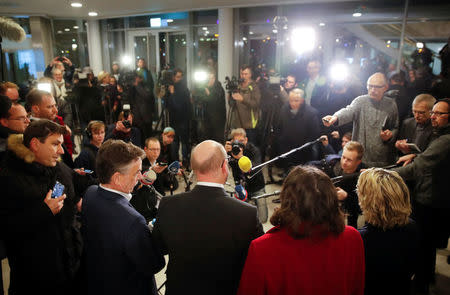Factbox: The SPD's path to a German coalition deal

BERLIN (Reuters) - Delegates to a special congress in Bonn of Germany's Social Democrats (SPD) vote on Sunday on whether to let their leadership enter formal talks on joining conservative Chancellor Angela Merkel in government for another four years.
Party bigwigs led by leader Martin Schulz are arguing for a repeat coalition, saying that a blueprint they have thrashed out with Merkel's camp secures clear left-wing policy goals and that the SPD should step up for the sake of the country.
But much of the party's membership, bruised by its disastrous showing in a September national election, oppose renewing the coalition. Local party branches in the states of Saxony-Anhalt and Berlin have both also rebuked the leadership with symbolic votes against a tie-up.
Even if the 600 delegates vote to authorise talks on Sunday, Schulz's team has one more hurdle to clear. The party's 443,000 members must vote in a postal ballot to approve the final coalition deal before the SPD can agree to join a government.
Following is a list of key stages in the SPD's ratification process.
REGIONAL PARTIES
The SPD's regional branches in Saxony-Anhalt and Berlin have both voted against opening coalition talks, but they are minnows compared with the branches in its western German heartlands. Furthermore, delegates are free to vote their consciences, unconstrained by their regional parties.
CAMPAIGNING
Supporters and opponents of the deal are criss-crossing the country trying to win delegates to their cause ahead of Sunday's congress. Schulz and most of the 45 members of the party's presidium back a deal. Six of them oppose it and are joined by other groups, including the Jusos, the party's youth wing.
Schulz was in Dortmund on Monday, urging delegates from North Rhine-Westphalia, the largest branch of the party, to back the deal, and leaders can be expected to focus further lobbying on the delegates from Lower Saxony, the second-largest branch.
Although the party's leftist groups broadly oppose the deal, some are nonetheless in favour of authorising talks, arguing that it is for the party's broad membership to decide if they want to reject or accept a final deal.
Schulz also has the support of trade unions and the municipalities, which have largely welcomed the deal.
CONGRESS
The 600 delegates and 45 presidium members vote at Sunday's congress in the former West German capital of Bonn. Thirty-two of the presidium members have already voted in favour of talks, six against.
The North Rhine-Westphalia branch will have the greatest weight at the congress, contributing 144 of the 600 delegates. It will be followed by Lower Saxony, contributing 81 delegates. Failure to carry these two branches could be fatal to the deal.
The Jusos youth organisation, the largest group to have announced its opposition, which represents all members aged below 35, will have 80 to 90 delegates.
POSTAL BALLOT
Assuming talks go ahead and yield a final coalition agreement, Schulz has pledged to ask the SPD's 443,000 members in a postal ballot if they back a renewed coalition.
(Reporting by Holger Hansen; Writing by Thomas Escritt; Editing by Hugh Lawson)

